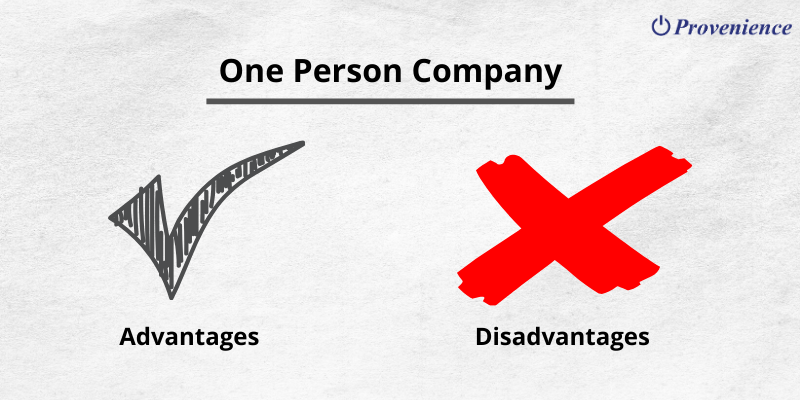Introduction of the Companies Act, 2013 saw the dawn on many new concepts in India. One such change was the introduction of a One Person Company (OPC). It offered individual entrepreneurs an opportunity to create and run a company with limited liability. There are many benefits of starting an OPC and a few restrictions as well. Also, there are certain eligibility criteria, requirements, and compliances to take care of. In this article, we will explore a One Person Company and talk about the eligibility criteria, requirements, and compliances & privileges surrounding an OPC.
What is a One Person Company (OPC)?
The Companies Act, 2013 defines a One Person Company (OPC) under section 2(62) as “A company with only one member”.
- The member is the shareholder or subscriber to its memorandum of association
- Hence, an OPC is a company which has one shareholder who is also a member
- You can register an OPC only as a private company
Further, section 3(1)(c) requires OPC owners to mention the term ‘One Person Company’ behind the name of the company wherever it appears.
One Person Company Eligibility in India
As per Rule 3 of the Companies (Incorporation) Rule 2014 the eligibility criteria  for starting an OPC are as follows:
for starting an OPC are as follows:
- A natural person who is an Indian citizen and resident in India for at least 182 days during the immediately preceding financial year
- He/she cannot be a member or nominee of more than one OPC
- Minors are not allowed as members or nominees
OPC Features and Requirements in India
- Members: Unlike other companies, an OPC can have only one shareholder or member
- Mandatory Nominee: The sole member of an OPC is required to specify a nominee while registering the OPC. In case of the death, insanity, or incapacity of the sole member, the nominee shall become a member of the Company.
- Minimum and Maximum Directors: An OPC needs a minimum of one director and a maximum of 15 directors.
- Minimum paid-up share capital: There is no minimum paid-up shared capital specified by the Companies Act, 2013
Additionally, the Act offers several privileges and exemptions to an OPC that is not offered to other types of companies.
OPC Compliances and Privileges
Here is a list of compliances and privileges of an OPC in India:
Board Meeting
Unlike other companies, an OPC is not required to hold formal meetings. Instead, the member can communicate the resolution in the minute’s book of the Company. As per Section 118, if the member updates the book and signs it, then the date of the update is considered as the date of the meeting. The OPC complies with section 173 if it conducts at least one board meeting in six months. Also, these meetings need a gap of more than 90 days. If the OPC has only one director, then the Quorum of Meeting of the Board of Directors is not applicable. An OPC does not have to conduct an Annual General Meeting (AGM).
Financial Statements
From the list of mandatory financial statements that a company needs to file at the end of every year, an OPC is exempted from filing the Cash Flow Statement. The Board can approve the other financial statements. Also, only one director needs to sign them before submission to the auditor. Further, the OPC needs to file a copy of the financial statements along with other documents with the Registrar Of Companies within 180 days from the end of the financial year. A company secretary and one director need to sign the annual returns of an OPC. If there is no company secretary, then the director alone can sign it.
Auditor Appointment
An OPC needs to appoint an auditor within 30 days of its incorporation. The auditor needs to be a practicing Chartered Accountant. The director of the OPC must appoint the auditor for auditing the financial statements of the OPC.
Some other privileges:
- Provisions offered to independent directors are not applicable to OPCs
- An OPC can provide additional grounds for vacation of a director’s office in its articles
Conversion of an OPC into other companies
The owner can convert an OPC into a private or public limited company voluntarily or mandatorily:
Voluntary Conversion
The owner can voluntarily convert an OPC into another company only after two years from the date of its incorporation. Also,
- The OPC must have the paid-up capital less than or equal to INR 50 lakhs AND
- Its annual turnover during the past three immediately preceding and consecutive financial years must not exceed INR 2 crores
The OPC needs to fill form INC 6 to apply for the conversion along with the following documents:
- A declaration of the director that confirms that all members and creditors of the OPC consent to the conversion. Also, the financial thresholds are within limits
- Complete list of members and creditors
- Copy of the letter of no objection from the creditors
- An audited balance sheet of the profit and loss account of the OPC (latest)
Compulsory or Mandatory Conversion
An OPC needs to compulsorily convert into a private or public limited company if:
- Its total paid-up capital exceeds INR 50 lakhs OR
- The average annual turnover during the past thee immediately preceding and consecutive financial years exceeds INR 2 crores
If any of these conditions occur, the OPC needs to mandatorily send a notice of the occurrence to the Registrar of Companies via Form INC-5 within 60 days of the occurrence. Further, the owner must convert the OPC within 6 months of the date of occurrence of any of the above two events. Most other processes are similar to the voluntary conversion process described above.
Restrictions
- The owner cannot incorporate or convert an OPC into a company specified under Section 8 of the Companies Act, 2013
- An OPC cannot invest in non-banking financial instruments including investing in securities of any Body Corporate
Summing Up
One Person Company is an excellent alternative to a Sole Proprietorship for small businesses. Since it separates the legal identity of the owner from the company, an OPC offers the benefit of limited liability to small business owners. Also, if the business grows, then you can convert it into a private or public limited company. Before you incorporate your new business idea, take some time to read about OPCs and make an informed decision. Do let us know if you have any further questions.
















